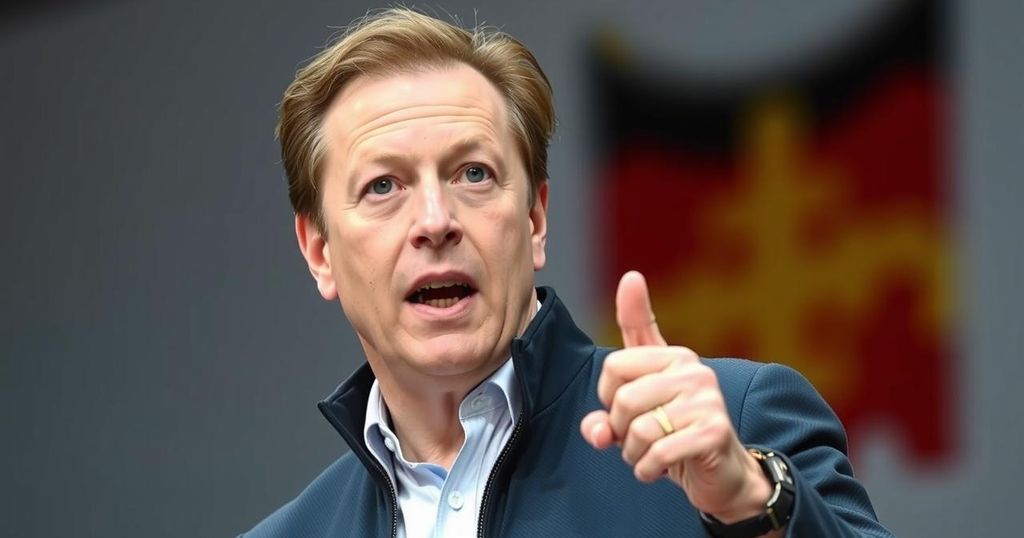Elon Musk’s Controversial Support for Germany’s Far-Right AfD Party
Elon Musk endorsed the far-right AfD in a recent op-ed, stating it can revive Germany amidst looming economic and cultural challenges. His support ignited significant backlash from German politicians and media, with accusations of election interference. Critics argue the move aims to normalize far-right ideologies, raising concerns about the role of influential figures in democratic processes as Germany heads toward elections.
In a recent op-ed for the German newspaper Welt am Sonntag, U.S. tech billionaire Elon Musk reaffirmed his support for the far-right party Alternative for Germany (AfD), stating that it represents Germany’s potential for economic and cultural revival amid turmoil. Despite criticism labeling the AfD as extremist, Musk argued that its leadership, particularly Alice Weidel, contradicts such a portrayal and suggested that the party’s policies could address pressing economic challenges through decreased regulations and taxes. This endorsement has incited significant backlash among German political leaders and media, with critics accusing Musk of interfering in German elections and attempting to normalize far-right ideologies. Musk’s influence, combined with his extensive social media following, raises concerns about the legitimization of populist rhetoric in Germany and beyond.
The controversy surrounding Musk’s op-ed is further compounded by its publication in Welt, a conservative outlet whose leadership has previously expressed admiration for him. The editorial decision led to protests from within the newspaper’s staff, reflecting broader tensions regarding media integrity and political endorsements. Germany’s press freedoms allow for expression of political opinions; however, this incident highlights the potential pitfalls associated with high-profile endorsements that may skew public discourse.
Elon Musk’s endorsement of the AfD comes amid a significant rise in the party’s political presence, with current polling indicating they command 20% support among voters. As Germany approaches its February elections, the far-right party’s rhetoric and policies have become a focal point of political contention. This situation reflects global trends where political figures leverage their platforms to influence democratic processes, raising questions about the integrity of electoral systems. The AfD’s appeal largely stems from its anti-immigration stance and promises of economic revitalization, which resonate with segments of the population concerned about cultural identity and economic stability. The backdrop of this endorsement features Germany’s rich tradition of press freedom, protected under constitutional law, allowing media outlets to express political opinions. However, this case has sparked debates about the responsibilities of the press in light of potential manipulation by influential figures. The editorial staff at Welt voiced concerns that Musk’s article might serve as a vehicle for advancing radical political ideologies, undermining journalistic integrity in the lead-up to elections.
In conclusion, Elon Musk’s endorsement of the AfD has stirred widespread controversy and accusations of interference in the democratic process in Germany. His assertions regarding the party’s ability to address economic issues and cultural concerns have been met with resistance from political leaders and journalists alike. This incident reflects a broader struggle within Germany regarding media responsibility and political influence, as the country navigates its upcoming elections amidst rising populism. The implications of such endorsements extend beyond national borders, highlighting a pattern of increasing right-wing populism worldwide.
Original Source: www.dw.com




Post Comment